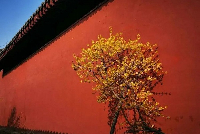Activities of Dongyue Temple Fair
(1) Opening ceremony
Time: 09:00, April 21
Add: Tianzhu Hall, Dai Temple
Introduction:
Performances, such as pipa playing, by Chinese and international artists, will be staged after leaders’ speeches.
Dai Temple, or Dongyue Temple, is a Taoist temple located to the north of Tai'an, Shandong province.
Together with the Forbidden City in Beijing, the Temple of Confucius, the Kong Family Mansion and the cemetery of Confucius in Qufu, and the Mountain Resort in Chengde, Dai Temple is one of the four China’s best-preserved architectural complexes.
Initially constructed from the Han Dynasty (206BC-220), Dai Temple was built as where the emperors made sacrifice to the gods of Heaven and Earth, and worshiped the god of the Mount Taishan.
Covering an area of 96,000 square meters, the temple houses various stylish buildings including Tiankuang Hall, Zhengyang Gate, Drum Tower, Han Dynasty Cypress Courtyard, and the Tang Dynasty Pagoda Tree Courtyard.
(2) Intangible cultural heritage performances
Time: April 21-25
Add: west side of Tianzhu Hall
Introduction: To inherit intangible cultural heritages, Shandong clapper ballad performances, lion dance, dragon dance and face-changing will be staged every day.
(3) Exhibition of traditional handicrafts
Time: April 21-25
Add: Ren’an Gate
Introduction: Traditional handicrafts around Taishan Mountain such as paper-cut, embroideries, wood carving and clay sculpture will be displayed.
(4) Performances of traditional operas
Time: April 21-25
Add: Tanghuai Garden
Introduction: Professional troupes of Shandong Bangzi will have live performances of new historical plays.
Shandong Bangzi, or Wooden Clapper Opera, is commonplace in cities such as Heze, Jining and Tai’an, and rural areas in Liaocheng and Linyi.
Shandong Bangzi is derived from Shan-Shaan Bangzi, which is native to Shanxi and Shaanxi provinces. It was introduced to Shandong province over 300 years ago.
The opera features passionate tunes depicting Shandong’s culture and folk customs. In May 2006, Shandong Bangzi opera was on the list of national intangible cultural heritages.
(5) Games of ancient athletics
Time: April 21-25
Add: Tanghuai Garden
Introduction:
China is well known as an ancient country with a civilization several thousand years old. But few people know that sports in China claim a history as long and honorable as the country's civilization. Ancient relics that have been unearthed indicate that people in China 4,000 to 10,000 years ago already knew how to do physical exercises to limber up themselves.
For example, China's ancient Chuiwan, whether in the equipment, the course and the rules -- even in the etiquette -- is very similar to modern golf.
Touhu, or throwing arrows into wine pitchers, can trace its history back to the Spring and Autumn and the Warring States periods (770-221 BC).
(6) A performance of Chuiwan
Time: 09:00-11:00
Add: Tanghuai Garden
Introduction:
Chuiwan was a game in ancient China. Its rules resemble modern golf.
The game became popular by the Song Dynasty; and a work called Wan jing (literally "ball-treatise") of the Yuan Dynasty was specially devoted to it.
The latest documents about chuiwan in China are from the two paintings of the Ming Dynasty from the 15th century.
There is a color image of the mural painting still preserved on the wall of a Water God Temple in Hongdong, Shanxi. A Chinese scholar suggested the game was exported to Europe and then Scotland by Mongolian travellers in the late Middle Ages.
The rule for Chuiwan is remarkably similar to that of modern golf, in that players use a set of up to 10 clubs, balls are of different sizes and made of wood, holes are spread on terrain of various difficulty, and marked by color flag; Tee off area is called Ji - which means base in Chinese; there's also strict etiquette and rule with regard to player honesty and cheating penalties.
Popularity of this game of Chuiwan peaked in Song Dynasty, when Emperor Huizong was reported a dedicated player, it remained a favorite sport during Yuan Dynasty and Ming Dynasty, in Qing Dynasty game of Chuiwan steadily declined, when it became casual game for women and children.

 Shandong: Where Excellence is made
Shandong: Where Excellence is made Building a Moderately Prosperous Society: The Tai'an Way
Building a Moderately Prosperous Society: The Tai'an Way Video: Jiunvfeng Park
Video: Jiunvfeng Park

